The Heirloom Gardens Project records the stories of elders and honors both long-held expertise and culturally meaningful foods.

The Heirloom Gardens Project records the stories of elders and honors both long-held expertise and culturally meaningful foods.
June 4, 2024
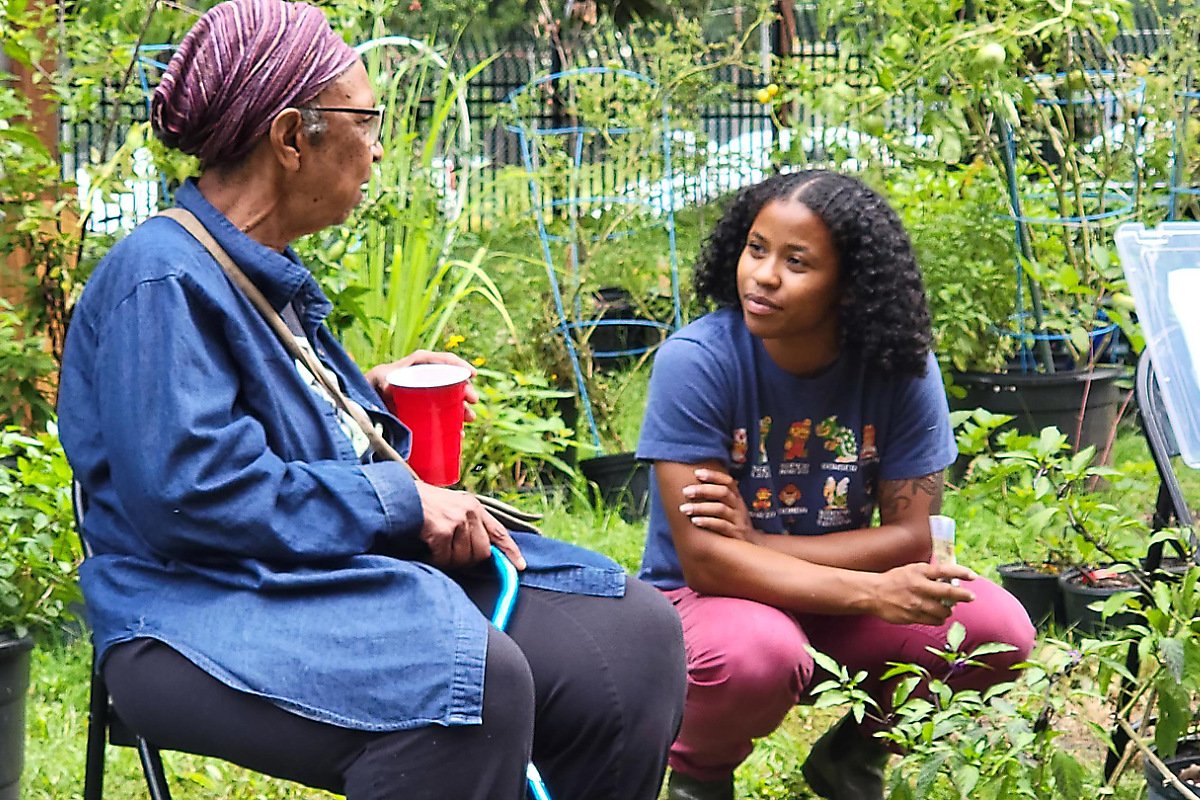
Ira Wallace (left) and Sariyah Benoit sit together in Spelman College’s Victory Garden. (Photo credit: Heirloom Gardens Project)
Traveling through Appalachia, Tessa Desmond and her team kept hearing the seed stories. As interviewers with the Heirloom Gardens Oral History Project (HGP), they spent more than two months talking to home gardeners, cooks, farmers and local historians, learning about seeds that had become part of family lore: the fistful of crowder peas discovered in a late grandmother’s bible, a place of importance to her, or the rare collard greens seeds now named Nellie Taylor collards, which were offered by her son-in law, who plucked them from the freezer where they had been stored in a plastic bag for 30 years since her passing.
He had overheard Desmond discussing seeds with his neighbor. “People have hung on to seeds even when they aren’t actively planting and tending them,” says Desmond. “They hold memories and are cherished as story and timekeeping objects.”
Agriculture has been a way of life and a source of meaning and pride for Black and Indigenous people for centuries, shaping rituals, beliefs, and traditions. Slavery and colonialism exploited their agricultural knowledge and shattered their lives. The heirloom gardens project, a collaboration between Princeton University, Spelman College’s Food Studies program, and Ujamaa Cooperative Farming Alliance, aims to memorialize their long-held expertise and culturally meaningful foods.
For two years, students and faculty are collecting the oral histories of community members in the southeastern United States and Appalachia who are preserving their agricultural, culinary, and medicinal traditions. Oral history is a natural vehicle for these stories. For centuries, most Black Americans were denied learning to read or write, and passed information through the spoken word instead.
The HGP is not a traditional research project, says Hanna Garth, an assistant professor of anthropology at Princeton and a principal investigator with the group. It publishes the memories as raw transcripts rather than presenting them through an academic lens. “It’s how [the subjects] see their own lives,” she explains, “rather than someone from the outside reflecting on how we might see their lives.”
The transcripts are housed in an easily accessible public archive. Researchers hope the knowledge they contain will be used in various ways—for example, to create a community garden with culturally significant plants, to further explore people’s experiences, or to dig deeper into issues related to land access, gardening, farming, and food access and sovereignty.
The HGP grew out of the pandemic’s early days, when Ujamaa, a collective of heirloom seed growers, held a Zoom series with grandmothers discussing their culinary memories—including what their own grandmothers ate and grew in their gardens.
Garth and Desmond, a research scholar at Princeton and an Ujamaa board member, and HGP’s other principal investigator, then won a two-year grant from Princeton to develop the project. Once 150 interviews have been completed, Ujamaa members will be trained to continue the work and to expand its geographic reach.
Ujamaa is also tracking down the seeds mentioned in the interviews so it can provide them to farmers for growing more seeds. Seed farming offers farmers an additional revenue stream with a lighter lift than market farming, with less field time, lower seed costs, if any, and a ready market as demand for seeds outstrips supply.
If a farmer can become established as a grower of certain types of seeds, larger seed companies are more likely to contract with them to provide those seeds to a wider market. Ujamaa’s mission is to cultivate and create agency for BIPOC farmers and give their communities easy access to the foods important to them.
Civil Eats recently spoke to two of HGP’s key figures, Ujamaa co-founder Bonnetta Adeeb and Desmond, about how HGP democratizes seed collection and knowledge-sharing while supporting diversity in the seed industry. We’ve included audio samples of oral histories from the project.
How do you decide what is a culturally meaningful food?
Adeeb: During COVID, when we lost so many seniors, we were hustling to interview elders about what was culturally meaningful. They would talk about what was in their grandmothers’, their ancestors’ gardens, what was important. What did they eat? What was medicinal? What exactly was being grown there? For about nine months, we [asked these questions] across the diaspora. We gathered this data. It was grandma approved, so our authority comes from the elders. This work is central to who we are and to having the authority to answer the question, What is culturally meaningful.
What does it mean when culturally important plants are lost?
Adeeb: African American history is being outlawed in Florida’s public schools. That knowledge is power. It’s super important [to others] to take that power, that knowledge, away, because without it, you don’t realize the strength on whose shoulders you stand.
Recently in Baltimore, there was a USDA person telling Black farmers that cowpeas were not safe for human consumption. We’re talking about black-eyed peas, one of the most important foods. It’s incumbent on us to reclaim that.
Civilization is built on the back of successful agriculture. We’re reclaiming that tradition, honoring our ancestors. Agriculture is culture. And how could you not feel better about yourself when you realize the genius of your ancestors? It was their I ndigenous knowledge that created the benefits we have. As we celebrate them, we celebrate ourselves. It builds pride, strength, and courage, and enables us to fight another day because we ate a good meal.
Ujamaa, a Swahili word which means cooperative economics, wants to increase diversity in the seed industry and bridge the gap between prospective growers and seed companies. How will the oral history project support that?
Adeeb: There was a loss of farmland, farm traditions, knowledge, and skills being passed from one generation to the other due to migration. A lot of our work is restoring the basic knowledge and traditions. We’d like to take that further and look at the Indigenous seed-keeping skills and technologies that develop the ‘crops’ we have today. That’s an important part of our work.
The industry is consolidating. We need to develop seed companies like ours that focus on the foods that are important to [our] communities. Who better than the farmers themselves to grow what’s culturally meaningful for them?
A lot of Black and Indigenous farmers are working full-time jobs and farming on weekends and at night. Growing heirloom varieties—seeds that reproduce like their grandparents, otherwise, we’re not eating the food of our ancestors—will create revenue and give our growers a way to hold on to their farms and increase their control.
Desmond: People have known that knowledge is valuable for a very long time, but it has been systematically diminished. Some of the most exciting stuff happening in the urban local regional food system is led by people of color. Ancestral knowledge is with the people who stayed in the rural areas who are aging out.
We want [other growers] to know how Miss Birdie May from Farmville, North Carolina, developed this really awesome system when her collards go to seed. That’s how the oral history project is growing BIPOC growers, acting as a bridge across this huge geographical divide that is the product of the Great Migration and aggravated by that history.
It sounds like the stories themselves are like seeds, germinating new information and understanding.
Adeeb: We’ve found seeds bred by incarcerated people. How could you not want to follow that story? Boleiti collard is one. I recently heard about the boleiti being important to the Lumbee [Tribe of North Carolina], who have made these delicious collard greens sandwiches out of it. That got me really excited. Even the industrial prison complex recognizes skills within the community. They knew these foods were important.
Desmond: Some might think, “Oh, this was bred in a jail. How horrible.” Then you meet the teacher of the horticulture class, and he had incredible pride. The way he tells it, folks are excited to work and be on the farm and out of their cells. They’re expressing a real creativity in plant selection are proud of the variety that they’ve developed over time. They sent collard greens to the governor’s mansion, [which] were served at a meal. …the seeds offer opportunities to find these stories, get really deep into the details, and humanize everybody involved.
Excerpts and audio snippets from the Heirloom Gardens Oral History Project. Text transcripts have been lightly edited for clarity.
Eulalia Williams, Farmville, North Carolina
Founder of the Farmville Community Garden. Raised in Farmville and Compton, California.
I would follow Granddaddy out to the garden that was plowed by the mule. We plant corn, plant fish heads under the corn. My mother would go out with the saltshaker in the morning and we’d pick tomatoes and eat those. We would harvest things in the morning, prepare them, and they’d be on the table for 3 o’clock. It was comforting to me. I wanted it and fresh vegetables again. That’s what got me into community gardening. It wasn’t community gardening—it was backyard gardening. Everyone had one.
But when I came back [to Farmville] in 2014, there were none. It’s like, “Wait a minute. We used to grow our own food here. We didn’t have to go to the grocery store.”
I hope the [community] garden encourages people to realize that you are what you eat. They have control over that. They don’t have to just settle for what can be found in the grocery store. Take that control and use it to grow up bigger, stronger, and help other people. We can do a revolution here. We can make a difference.
Vivian Fields, Farmville, North Carolina
Lifetime resident and longtime gardener.
It wasn’t integrated at the time, so we grew up hard in Farmville. We couldn’t hardly come across Main Street without being with the white. We fought all the time.
We always had to come to the north side to get groceries and everything. We didn’t have much money, so we all were raised on garden food and stuff. Whatever we didn’t have, we had to go to the white man and ask for it. If he didn’t OK it, we didn’t get it. I thought that was very wrong because we all were supposed to be equal.
On my side, we had chicken, hogs, turkey, and the hogs had barbecued pork and all of that. Collards and cabbages, potatoes, white potatoes, squash, and black-eyed peas was coming from the garden, so we had plenty of that.
That’s the only thing we ate was garden food. We very seldom [went] to the store and bought anything unless it was milk and bread.
Jennifer Kanyamibwa, Atlanta, Georgia
Co-founder of Plant Lady Juice Co. Born in Rwanda.
I think whether directly or indirectly, especially if you’re a Black farmer, you’re coming from a tradition where this is something that has been passed on. Growing things is the most human thing you can do. If you go throughout Africa, you see how people use herbs and food as medicine and as celebration. It is something that’s so intrinsically African and Black and Indigenous about growing your own vegetables and plants.
A lot of the farmers we work with are very, very committed to growing things that are natural to the surrounding environment and have a lineage and a thread to things you can trace back to Africa.
Folami Harris, Covington, Georgia
Woman farmer who grows vegetables and fruits that complement African cuisines. Raised in Kingston, Jamaica.
How do I grow things that bring us back to our roots? Because it’s more than just the taste. It’s also the memories and the possibilities for intercultural connections.
Everywhere I’ve gone, I’ve been a kidnapper of seeds. There were always seeds in my luggage that I hoped Immigration would never uncover. I was always intrigued by how we took food from one place to another and how we use them differently. We never ate sweet potato leaves, but in Africa, they were interested in the sweet potato leaves. Food, its history, and the diverse ways in which we use it are very intriguing to me.
It’s my hope that as we are able to boost production, we are able to create a more vibrant impact on what everybody eats, because it will be of interest to everyone, but first and foremost to us, and maybe it will revive interest in African diaspora cuisines. When we started, there was no “High on the Hog,” no “Searching for Soul Food.” When I watch that stuff, I’m so happy.
Emmanuel Fields, Frankfort, Kentucky
His grandmother’s sharecropping experience made him turn away from a connection to agriculture and community. Creating a Master’s thesis documentary about the Kentucky’s Black farmers transformed him into a seeker of stories and steward of the land.
Once I started the documentary, everything changed for me. It was not just to show and shed light on stories of inequalities, but to show essentially an amazing triumph. I learned [that] our history here, especially with growing things, is not completely wrapped up in slavery, in negative mindsets, or ways that are meant to attack and push you down.
Instead, those same things are used for triumph . . . and to show you exactly how strong you are and what you’re capable of doing.It rewrote a lot of things that I had solidified in my own head about my own history, my people’s histories. A new narrative has changed a lot of the way I see and move through the world.
These are things I can attribute to being completely centered around food and farming. If I can have a positive impact on one person who could be struggling like I was at one point with a lot of deep generational racial trauma and things that are passed down, I feel I would have helped.
Tiffany Bellfield El-Amin, Madison County, Kentucky
A third-generation farmer who stewards her grandparents’ land at Ballew Estates, where she was raised.
Grandma would have napkins—pawpaw tubes just full of seeds—from where we had brought stuff off our farm to eat, slices of tomatoes or cucumber. They would save the seeds in a napkin, come home, dry them out. That’s what you’re supposed to do after you eat the fruit: Take the seed and do it again. There would be a countertop full of seeds, cantaloupe, melons, watermelon. They were efficient people. I was born in ‘84, but I grew up with this lifestyle of, “You want watermelon, you better grow it.”
I feel like [my grandma] was like a botanist. She would make these tomatoes. They were juicy. Sometimes they’d get so big they’re mushy, but they were good. She would save those seeds and keep growing those.
This is the first time in a while where I’ve sat and thought, “You really ain’t got no seeds of your grandma’s.” They had all dried out. I have to cultivate something that produces seeds, so my grandchildren, godchildren, and kids can keep that going, because it’s so important.
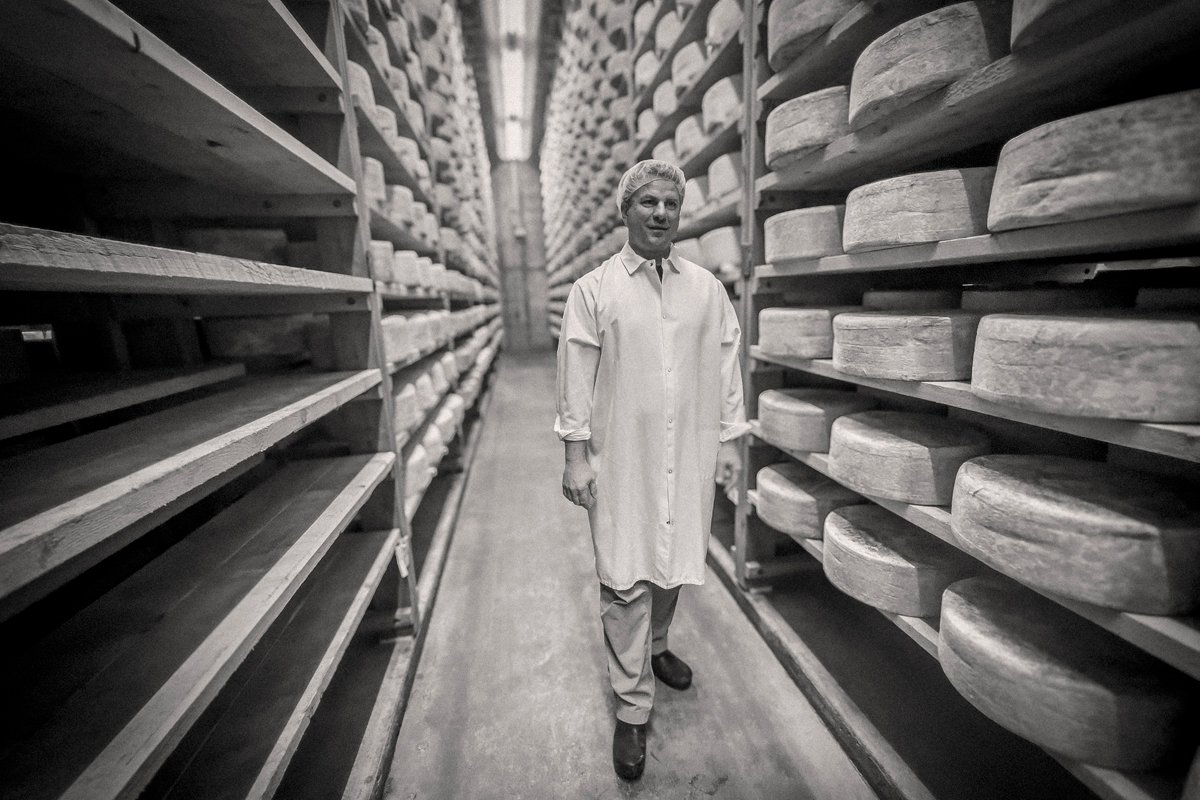
September 4, 2024
By paying top dollar for milk and sourcing within 15 miles of its creamery, Jasper Hill supports an entire community.
September 3, 2024
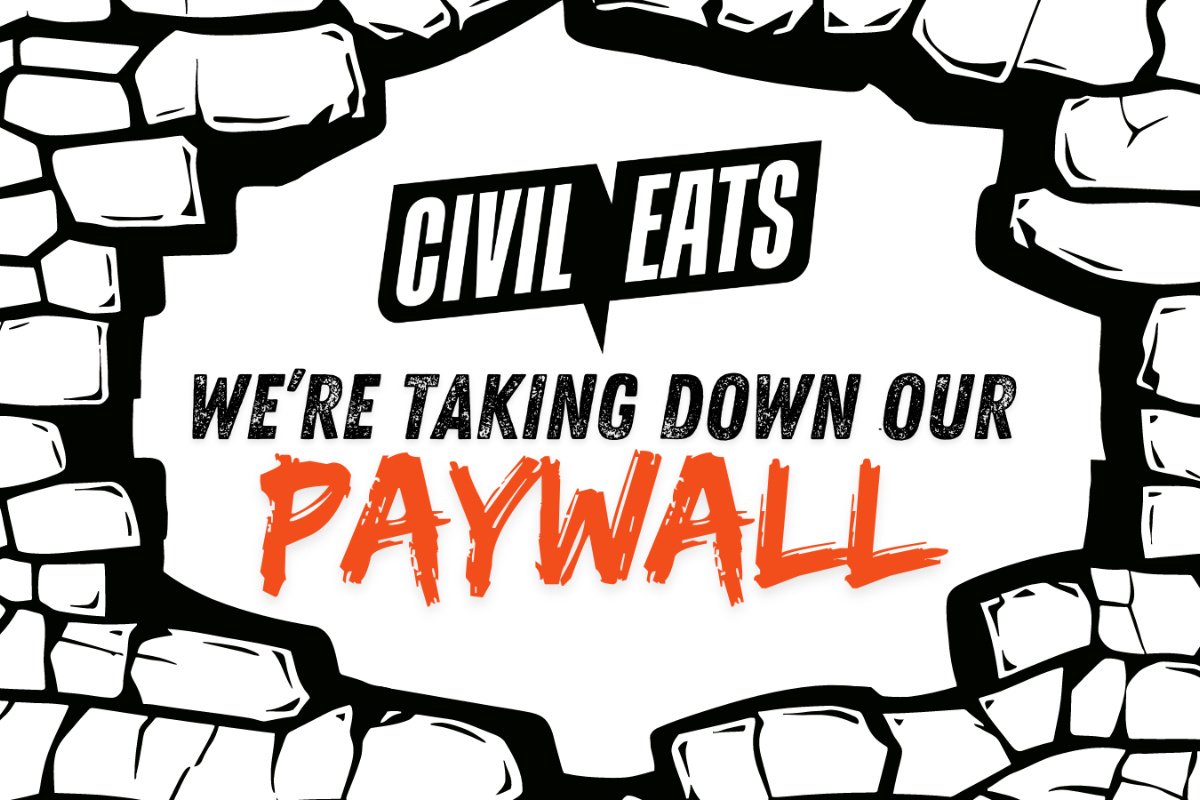
August 27, 2024

August 26, 2024
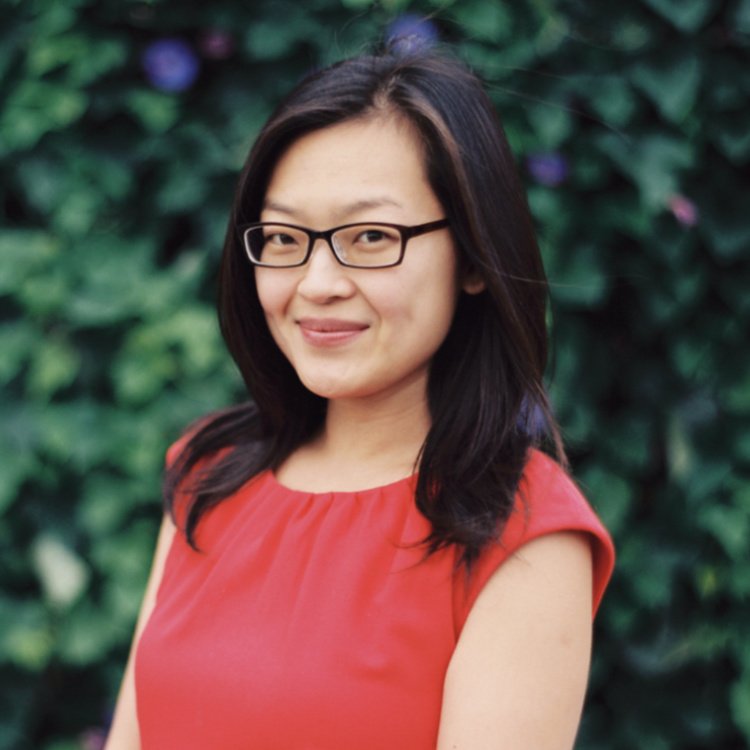
August 13, 2024
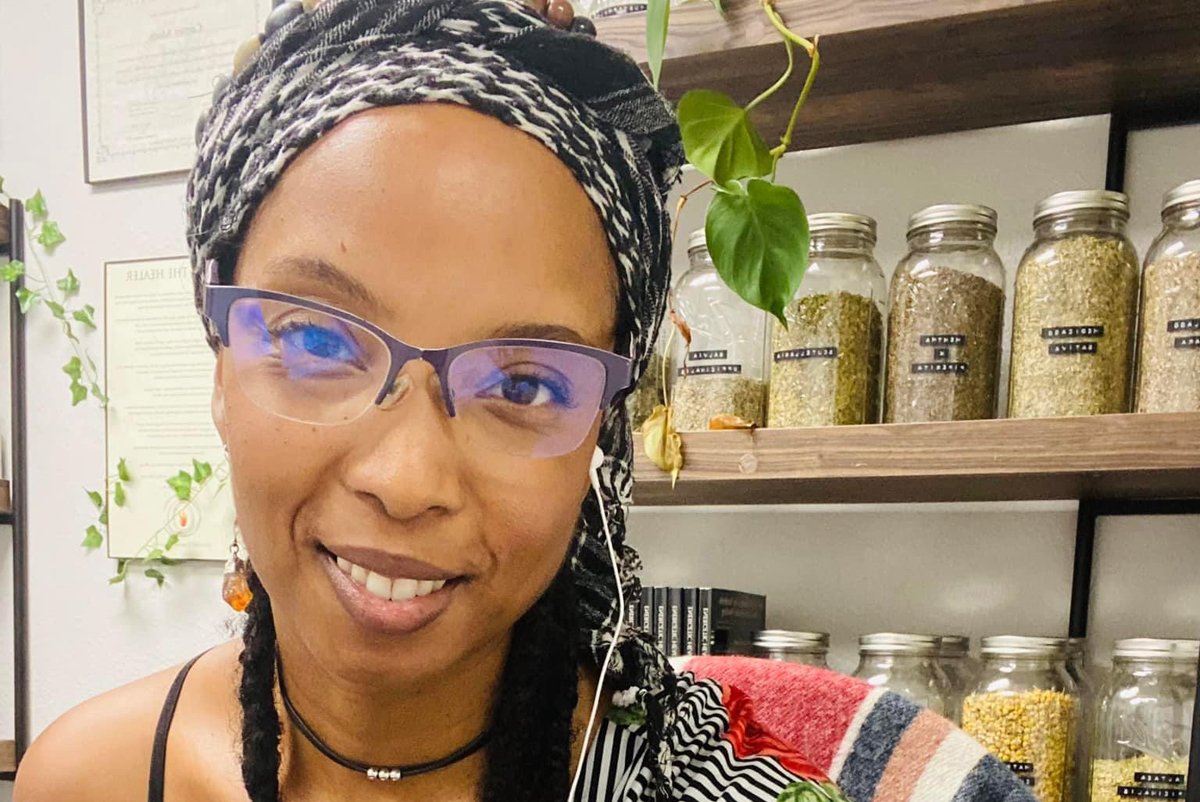
August 12, 2024
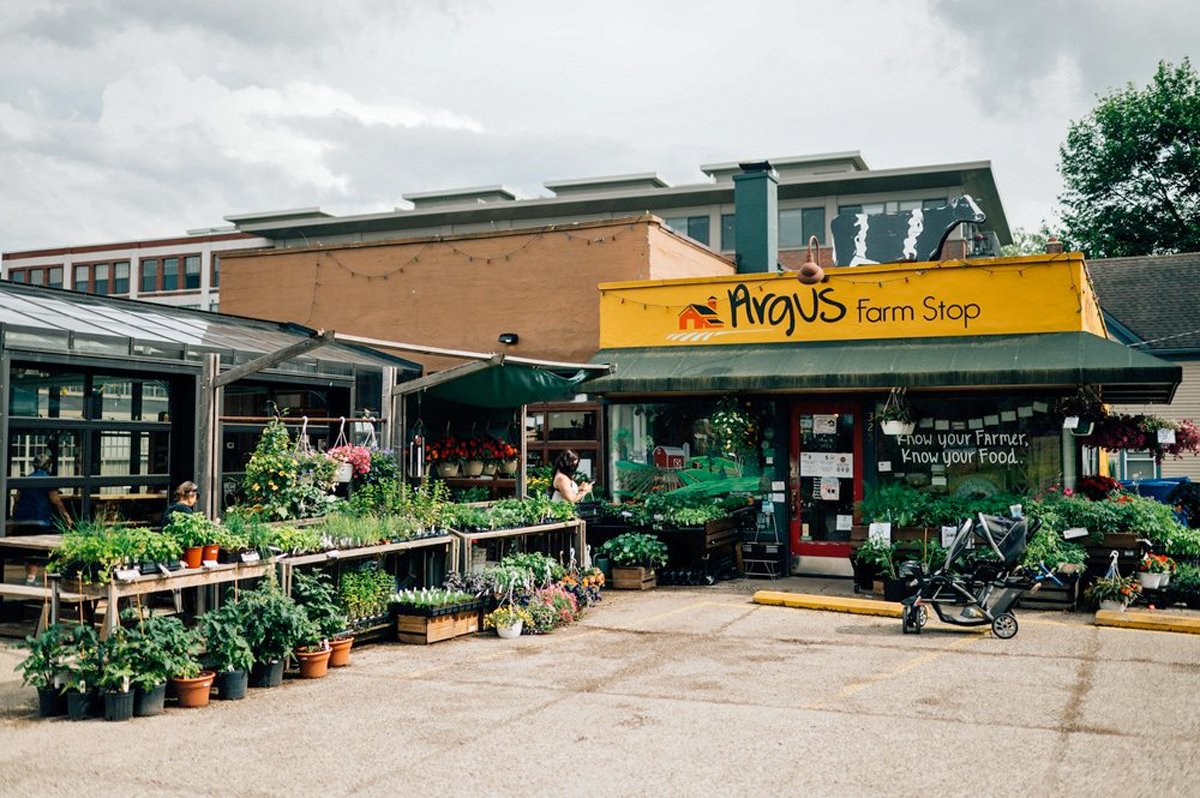
Like the story?
Join the conversation.